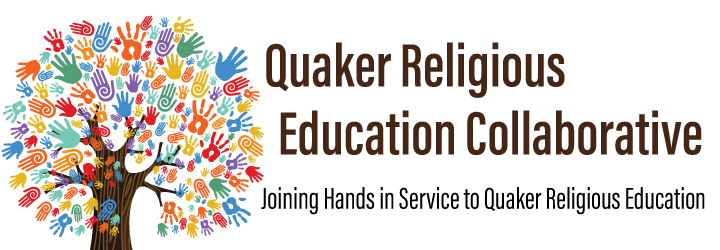
Walking in the World as a Friend: Essential Quaker Practice
Facilitators:
TUE Sita Diehl, Madison WI, NYM, QREC
THU Andrew Wright, Durham FM, NCYMC
WELCOMING WORSHIP & INTRO: Welcome to the Quaker Religious Education Collaborative Conversation Circle. We’re very pleased to see all of you. Please take a minute to put your name and monthly meeting or Quaker affiliation in the chat box. We are taking notes and will post them on the QREC website. And now, we delighted to welcome Nadine Hoover – lifelong Friend, author and activist – to help us understand this new resource. This all started at the 2019 QREC Conference when the question arose, “What does a Quaker DO that makes us Quaker?” The response was very unsatisfying: “Do what you want; find our own way.”
It is correct that Friends don’t have dogma or creed. We respect everyone and tend to speak for ourselves, not for others. BUT
- This response fuels individualism. And since Quaker practice is communal and individualism erodes community, this response actually undermines Quaker practice. AND
- Quaker practice is very simple, but it’s real and rich. It’s so simple that educated, competent people often rush right past it.
Nadine posted some approaches to teaching Quaker practice on the wall over lunch at the conference, which became the book, Walking in the World as a Friend. She’d like to guide this conversation through a few of those ideas that may be helpful for religious education with adults and youth:
- Three roles of being a Friend: minister, steward, and witness.
- Two experiences of the Spirit: convincement and conviction
- Experimenting with the Spirit in daily life
And now, Nadine will lead us through Walking in the Word as a Friend.
Nadine:
THREE ROLES: There are free videos that cover most of what’s in the book on YouTube at Conscience Studio go to Playlists. To get a flavor of this resource, I’ll start by showing you a couple minutes of video:
To give everyone a chance to share, we’ll put you into pairs for about five minutes to talk about your experience of these three roles in your spiritual life, as minister, steward, and witness.
- How do we separate our spiritual life from our life life?
- Attracted first by Quaker witness, discovered the spirituality later
- The essence to each, Listen deeply.
- Trying to listen deeply and embrace independent spirituality in this moment, appreciated the structure of breakout sessions throughout to support participant engagement
What about the role of “elder”? Nadine: that is a role that is conferred on Friends through recognition of a particular gift. It is not a role for every Friend.
Nadine thank you. When Friends take on the ‘eldering ‘ role without understanding that it is a role, they do harm. I speak from an example in my family.
It’s important to define our RSoF as what we are and not what we are not. “Ministers” as the world defines them is not the same as the role of minister as defined here.
- I love to use the word ‘Friend’ and it helps me to see ministry as reciprocity
- Friend is simple, without the trappings that have gathered around ministry
TWO QUAKER EXPERIENCES: There are two videos, one on Convincement, about 5 minutes, and one on Conviction, about 8 minutes, that will give you more depth, but simply put what Quakers called convincement was that I’ve experienced the Living Spirit and so am convinced it’s real, like I’ve met you. If someone later says you don’t exist, I’d say, “Well I’ve met you and I’m convinced, so you can’t make me think otherwise.”
The more I experience the Spirit, the more I come to trust, build confidence in, and rely on the Spirit.
Mountaintop experiences, the more I experience the spirit, the more I come to trust, convincement; the places where I am broken or convicted are the place where we find religious conviction- early Quakers talked about convincement and conviction, we need full experience of the Spirit to live this life, our mistakes are the places where we learn, our weaknesses are the places where we genuinely need other people, the places where I mess up or am wrong are the places where I can gain some real humility and compassion for other people; strengths and weaknesses are all part of the whole, early Quakers talked about being our perfect part of the perfect whole- being perfectly ourselves
Breakout pairs: How you have experienced the Spirit in good times and in hard times? Highlights:
- We were aware that the spirit is with us in both places, but the spirit can be stronger in hard times, whether we’re ready for it or not, the Spirit has great compassion for us in the hard times, maybe we’re just oblivious in the good times.
- And really good to see that dark is wonderful, a place for seeds to begin life…
- The Spirit is there to pick me up, and to allow me to feel and experience genuine emotion
- Awareness of Spirit was going up and down, challenging herself to be more consistently aware, suddenly it flipped and was hard to see anything the world beyond Spirit, this is part of Quaker practice, we need to talk to each other about how we’re experiencing the Spirit in life, sometimes this happens in worship sharing, but we need small group companion time to talk about conviction and to talk about where we are struggling and how we experience the Spirit there, we choose to yield and allow the Spirit to guide our lives, if we have an experiment, having a journal is really important, what am I trying out now? What am I hearing now? How am I living that out? What fruits are coming of this, or not? Tests of discernment. Paying attention to the things that we think. If we are inwardly guided. The importance of the practice of stopping (worship). And the importance of Friends Testifying to the ways that we were being changed and get feedback (Monthly meeting)-affirming individual leadings and insights.
EXPERIMENTING WITH THE SPIRIT IN DAILY LIFE: Douglas Steere talked about a Quaker being someone who has experienced the Living Spirit that speaks to their human condition and yields to let the Spirit shape and guide our lives.
Convincement, from experience, conviction, in our human condition, and the conversion of manners or experimenting with being inwardly guided. There’s an 8-minute video on experimenting with the Spirit, but for now just realize how much time we have invested in training our minds to think, strategize, comprehend — and how much time we have invested in training our sense of inward listening, stopping, opening, receiving what may be beyond our comprehension, testing our discernment, sharing that with others, soliciting other’s feedback, trying the Guidance out, realizing it’s fruits…
When inwardly guided, two basic, clinical differences between inspired and neurotic are:
- Our ability to stop – hence meetings and opportunities for worship; and
- Our ability to respond to external feedback – hence monthly meetings to testify to how we are being guided and changed by the Spirit and receiving feedback from others.
Meeting for Worship predates Quakerism, which they kept–the practice of stopping, opening, and listening inwardly.
Spiritual Companions and Traveling Friends was the second major structure, which we are finding quite vital for us today.
Journal Writing could be seen another major structure, in that every good experiment needs a log, and they kept logs of their inward life, insights, and guidance.
Monthly Meeting was the third major structure, created as Quakers got a bit wild to come and testify to the direction they receive and get feedback from others engaged in the same experiment with the Spirit in their lives.
Regular Meetings of Ministers, Stewards (then called Overseers), and Witnesses followed, which became the current committee structure of most meetings.
Yearly Meeting was set up to meet each other face to face, experience beloved community, settle disputes, and tend the young and old.
Minutes and Faith and Practice documented the guidance that grew out of individual experience and was affirmed by the monthly meeting and larger yearly meeting bodies.
Open conversation: Do you find this useful for your RE for adults or youth?
- Reminded of Faith and Play Story- Listening to God
- Faithfulness Groups have really taken off in Cambridge, shout out to Marcel Martin
- Groups that are mutual are a rich support, gives a view of how completely different it is in different people’s lives, mutual groups are really important
- Many blessings in the pandemic: a regularly meeting Book Club- reading Our Life is Love, do 7-10 pages at a time, there is much to share, what potential is there in this pandemic? We want to be a lighthouse for the world, even as a small meeting. Attendance in zoom group is bigger than usual meeting for worship.
- Some come searching for community, others for witness, others to discover self- coming to Quaker practice or Quaker ecology is a really important part of Quaker faith and practice
- Children are growing up into teens & young adults, they identify as Quaker but don’t know how to articulate how they experience the Spirit, some of their friends are starting to discuss Quaker identity, we also have several visually impaired folks and appreciates the videos that are available on these topics
- We have a very active group in Durham Friends Meeting doing Experiment with Light, Zoom has been fantastic for this because it’s been easier to get people to show up, has multiple sessions a month, which include folks regionally and beyond, about 1.5 hrs each session, includes guided meditation and journaling
- How does one get to sign up and find out more?
- These are apocalyptic times, we need to be telling these stories, we can be encouraging folks to be writing their stories, we can see it in our meetings and in our kids
- I have so liked this session and everyone’s participation. I am wondering if it would be possible to meet for 90 minutes rather than 60 and thus be able to have our breakout groups a little longer. And maybe more of them.
- Thank you for making this space we can share in 🙂
- Helpful as a springboard for Meeting discussions. Have been working to develop some varied ways we can connect
- Grateful for this hour. Thinking about many ways to use this.
- As a member of our meeting’s Worship and Ministry Committee, I appreciate knowing about these teaching resources.
- I felt a bit out of my depth. My meeting seems to be lacking in formal Quaker Education writ large.
- Most of us are beginners. Walking in the World as a Friend is a good place to start because of the videos and the pithy workbook. If you would like to learn more resources for Quaker adult education you can go to the Quaker Religious Education Collaborative website, click on Resource Library and search for “Adult Religious Education”
- It’s full of insights, thank you
- We are reading Marcelle Martin’s Book OUR LIFE IS LOVE right now. It is our third book since sequestration. If this interests you, please email ascherl@gmail.com or hope.ascher@gmail.com
- Experiment with Light, by Rex Ambler: https://experiment-with-light.org.uk/
- Thank you for creating these great resources, Nadine! I’m glad to learn more about them.
- Wonderful
- Great seeing folks
- I look forward to looking into your curriculum as our next adult ed program.
- Great session – lots of food for thought. Thanks!
- Thank you Nadine and Sita! Wonderful resources and ideas.
- I like being with people willing to experiment with the Spirit in their lives.
CLOSING: Thank you Friends. A closing word, Nadine offers RE events, retreats, training, and coaching on Quaker practice and witness.
Nadine facilitates the following offerings for meetings or Quaker organizations:
- Walking in the World as a Friend: Essential Quaker Practices
- Spiritual Companion Groups retreats, support, and coaching
- Power of Goodness (PoG) 1-2 hour events on themes of peace and justice
- Justice for the Long Haul: Creating Cultures of Peace AVP series (CCP) in-depth training
To request information on upcoming events or coaching: ConscienceStudio@gmail.com. Donations are welcome because the work is supported by donations, and Nadine lives on gifts.
PeaceWays magazine from Friends Peace Teams. The fall 2020 issue focuses on Racial Justice. For a copy contact office@friendspeaceteams.org or donate to Friends Peace Teams.
Gratitude
Worship
Resources:
Walking in the World as a Friend: Essential Quaker Practices, Purchase book by Nadine Hoover, Conscience Studio
Walking in the World as a Friend, free videos:
- Three Key Quaker Roles: Minister—nurturing our inward lives; Steward—shaping our outward lives; and Witness—expressing faith and practice in our public lives, with five accompanying videos.
- Experiences and the Experiment of the Spirit: Convincement, Conviction, and the Conversion of Manners. Quakers experience the Living Spirit that speaks to our human condition in easy and hard times, in every person, every moment, everywhere. Quakers experiment with allowing the Spirit to shape and guide our daily lives through our human faculties of love, conscience, and discernment, with three accompanying videos.
- Religious Society of Friends: Essential Quaker Structures. The Spirit transforms individuals tested by their community, who test other communities to reveal societal guidance that shapes the lives of individuals, creating a regenerative ecology of practice, with seven accompanying videos.
Our Life is Love: the Quaker Spiritual Journey, by Marcelle Martin, Inner Light Books
Seekers Found: Atonement in Early Quaker Experience, by Doug Gwyn
PeaceWays Newsletter from Friends Peace Teams. The fall 2020 issue focuses on Racial Justice. For a copy contact office@friendspeaceteams.org or donate to Friends Peace Teams
Author: QREC
Illustrator:
Publisher: QREC
Age Group: 16 to 18 years, Adults, Young Adult Friends (YAFs)
Preparation Time:
Related File: Click to view/download file
Related Link (or File): Click to go to link
Topics: Adult Education, Adult Education, Essential Reading, Quakerism Intro



